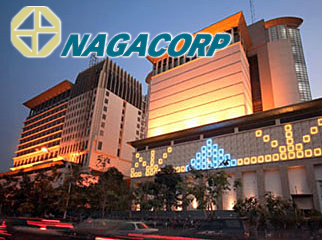 Cambodian casino operator NagaCorp boosted profits 20% to $62.9m in the first six months of 2013. Revenue grew nearly 15% year-on-year to $151.6m thanks to a burgeoning mass market segment and higher VIP margins at NagaWorld, Phnom Penh’s only licensed gaming joint (pictured right). NagaWorld’s gaming floor, which features 178 gaming tables and 1,450 electronic gaming machines (EGM), accounted for the lion’s share ($141.7m) of revenue. By comparison, the property’s 700-room hotel earned $3.8m in room revenue (+45%) and the 15 food & beverage outlets added $5.4m (+8.6%).
Cambodian casino operator NagaCorp boosted profits 20% to $62.9m in the first six months of 2013. Revenue grew nearly 15% year-on-year to $151.6m thanks to a burgeoning mass market segment and higher VIP margins at NagaWorld, Phnom Penh’s only licensed gaming joint (pictured right). NagaWorld’s gaming floor, which features 178 gaming tables and 1,450 electronic gaming machines (EGM), accounted for the lion’s share ($141.7m) of revenue. By comparison, the property’s 700-room hotel earned $3.8m in room revenue (+45%) and the 15 food & beverage outlets added $5.4m (+8.6%).
NagaWorld’s EGMs – many of which are supplied by Entertainment Gaming Asia – boosted their handle 20% year-on-year to $558m, and despite win per unit per day (WUD) falling 5.9% to $224, EGM revenue was up 24.3% to $44m. The WUD dip is due to the addition of nearly 100 new machines via NagaWorld’s new mass market gaming area Saigon Palace, which opened in December. July saw the opening of the Aristocrat Private Club, a new premium mass gaming area featuring 30 EGMs and five higher-limit tables.
Business at the mass market gaming tables was booming with table drop up 20.2% to $192m and revenue up 15.8% to $44.3m. Mass table and EGM gaming accounted for 58% of NagaWorld’s revenue and 74% of its gross profit. VIP gaming accounted for 35% of revenue and 19% of profit, but VIP margin rose from 38% to 41%, which helped raise overall margins to 74% from 71%.
VIP table drop fell 1.3% to $2b and win rate was essentially flat, but VIP revenue managed to rise 6.2% to $53.3m. In March, NagaWorld introduced a new incentive program for its junket operators, which NagaCorp claims has resulted in a “greater increase in better quality VIP players,” i.e. higher win rates and profit margins. NagaWorld expects this “turnaround” to continue through H2.
In January, NagaWorld opened five private luxury gaming suites and two more are expected to open in H2. Construction is proceeding on the new Naga 2 facility, which broke ground in November and is to set to open its doors by the end of 2015 or early 2016. When complete, Naga 2 will feature 1k hotel rooms, a 4k-seat theater and up to 300 gaming tables and 500 EGMs.
The Hong Kong-listed NagaCorp recently raised $156m via a top-up placement of shares, and at least some of that haul will be targeted at delivering even higher quality to its VIPs in order to maintain “competitive position within the region.” In May, Rolex joined Cartier and Piaget in hanging out its shingle among NagaWorld’s luxury boutiques. These will be joined by Mont Blanc and Jaeger LeCoultre in H2.
VIETNAMESE LOVE CAMBODIAN BORDER CASINOS
The United Nations World Tourism Organization (the other WTO) says visits to Cambodia from Chinese nationals rose 53% year-on-year in the first five months of 2013. That surge in Chinese tourism represented 11% of Cambodia’s total 1.8m visitors, nearly knocking out South Korea’s 12% share. But Vietnam remains Cambodia’s top source of foreigners with a 19% share of the pie, in part because Cambodia offers the average Vietnamese resident an opportunity to legally gamble.
NagaWorld has a 41-year exclusivity (expiring in 2035) on casinos within 200km of Phnom Penh, but its monopoly doesn’t extend to the Cambodia/Vietnam border area. Vietnam’s southern province of Long An borders two Cambodian provinces that contain 11 small casinos. Despite widespread horror stories of Cambodian gangsters preying on Vietnamese gamblers, a 2012 survey by Vietnam’s Ministry of Public Security found these casinos received 1,500 visitors from Long An every single day.
The Vietnamese fondness for gambling is why international gaming companies keep pushing Vietnam’s government to change its stance on allowing locals inside casinos. Last year, Vietnam’s then finance minister went to Singapore to study its regulatory model, but he apparently took no notice of the fact that Singapore allows its locals to gamble, provided they pay a daily S$100 levy. Until Vietnamese authorities learn to cut their locals at least that much slack, significant investment by international casino firms will remain elusive.
